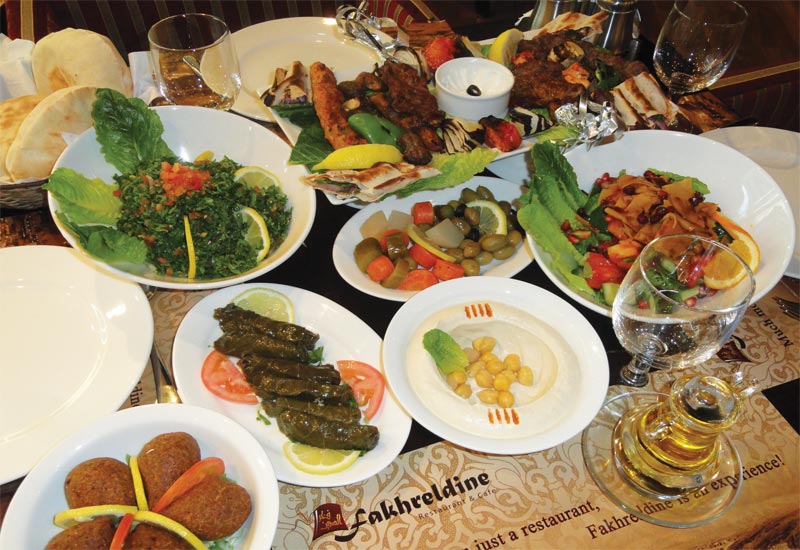Profitability
Lebanese is a very affordable cuisine and can generate good margins – especially in the high end outlets. This is welcome news to F&B operators in the current economic and political climate who are constantly remodelling their menus to combat rising food prices.
In comparison to some “meat heavy” brands like steakhouses, Lebanese outlets can source ingredients relatively inexpensively, as Frank Owens confirms: “Lebanese cuisine can deliver strong revenues because it is rich in things like olive oil and garlic – products that are relatively inexpensive. We source most of our ingredients locally, but we also import some from Lebanon.
We deal with reputable companies that supply quality but inexpensive ingredients. Also, some of the products are made in-house which is another factor in the affordability of the dishes.”

| Advertisement |
In the current tough economic climate, affordability of ingredients is particularly appealing to F&B operators. However, the commonly held view that Lebanese food is profitable because it is quick and cheap to make is not borne out in practice. The reality is a little more complex.
“While Lebanese food is perhaps cheaper on a product-by-product basis, you really need highly skilled chefs to execute the recipes properly,” explains Hage, “and that doesn’t come cheap – especially in Dubai!
“On top of that, we’re still dealing with rising food prices on a day-by-day basis. You have to find ways to sacrifice a bit, but without affecting quality.”
However, the fact remains that Lebanese restaurants do continue to thrive in difficult times. This is possibly because they offer more than just food – they offer a unique dining experience reflecting the Lebanese tradition of providing great entertainment around eating.
For example, the Lebanese mezze is an intrinsically social event with informal sharing of small dishes over a long period of time. In the current economic climate, consumers attach more importance to the dining experience – and Lebanese restaurants can offer an entertaining, filling and affordable F&B experience.
“We’ve seen a steady growth in both demand and supply at the same time,” says Alfred Moussa, director of F&B at Al Tannour, the Crowne Plaza Dubai, . “Even through the height of the economic crisis in 2009, Al Tannour performed well as an outlet and experienced healthy figures.
“I think that guests enjoy the entire experience when choosing a Lebanese restaurant. On top of tasty cuisine, Lebanese restaurants have a unique ambiance that is infectious – there is always live entertainment, an abundance of dishes and traditional aromatic shisha.”
A new wave?
In an expanding market, one would expect Lebanese outlets to reinvent their recipes in order to differentiate themselves from the growing competition in the market. As a fusion cuisine, this seems like a natural progression for Lebanese F&B operators, yet many top Lebanese chefs seem reluctant to deviate too far from traditional recipes.
“We are seeing Lebanese fusion restaurants popping up in Dubai,” observes Al Tannour’s Moussa. “These outlets take a modern twist on traditional Lebanese foods and have developed new presentation styles. However, at Al Tannour we believe the original and authentic tastes are best and we do not want to stray away from the formula that makes Lebanese cuisine so popular and Lebanese restaurants so successful.”
However, chefs are finding new ways of presenting tried and tested dishes. In many respects, the mezze lends itself to this as a modular, multiple small portion method of presenting food.
Keeping in line with the emerging health trend, Lebanese dishes are becoming smaller, which is good for healthy eating, good for profitability and good for more creative presentation.
“Because traditional Lebanese dishes are usually generously sized for sharing, the scope for creative presentation is somewhat limited when compared with contemporary dish presentation,” concludes Mueller.
“However chefs are becoming more creative in their presentation of Lebanese food to a growing customer base by using smaller portions on the plates and by innovative use of contemporary angular tableware.
“And the great thing about Lebanese cuisine is that this does not have a sizable impact on cost. The simplicity of Lebanese food means that ingredient costs are generally quite low allowing chefs to invest in higher quality ingredients.”
New fusion brands will undoubtedly emerge, but Lebanese food has a strong identity that is shared in many markets around the world. It makes good business sense to stay close to this truly international brand that has built a reputation over many hundreds of years.
Lebanese cuisine has a rich and proud heritage. Why should we mess with it now?
Article continues on next page...









 Search our database of more than 2,700 industry companies
Search our database of more than 2,700 industry companies









